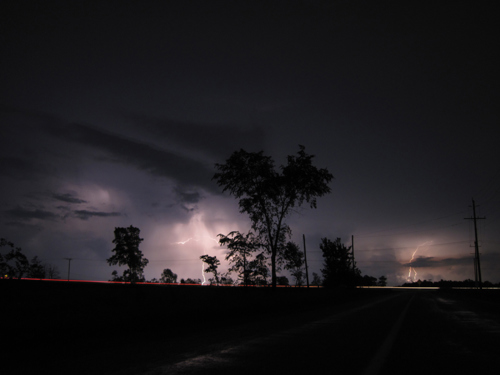Severe Weather
Be prepared when Mother Nature gets angry
Severe weather refers to any dangerous meteorological phenomena with the potential to cause damage, serious social disruption, or loss of human life.
How will you know when severe weather is coming?- Environment Canada issues a warning when severe weather is about to or is occurring.
- A watch is issued when conditions are favourable for the development of severe weather.
- A special weather statement is issued for unusual weather events that may be an inconvenience or may be a potentially hazardous situation in the long term forecast.
- Alert Ready: Canada's New Emergency Alert System
Use the tabs below to browse information regarding weather types.
Strong winds and tornadoes can cause property damage or turn any loose items into flying debris. They can affect your ability to safely steer your car and make it hard to walk. High winds in combination with heavy rain can increase the risk of tree limb breakage or trees uprooting. Tornadoes can move quickly leaving a wide strip of destruction or touch down sporadically leaving a path of damage.
Most tornadoes occur in June and July (although their season extends from April to September). They frequently develop in mid-afternoon to early evening.
Tornadoes often appear behind heavy rain or hail in a sky that is green, yellow or black. Very large thunderstorms can make multiple tornadoes.
Prepare Now
- Designate a safe room in your home where household members and pets may gather during a tornado. This should be a basement, storm cellar or interior room on the lowest floor with no windows.
- Conduct a tornado drill so that everyone knows what to do if a tornado is approaching (e.g. practice going to your safe room).
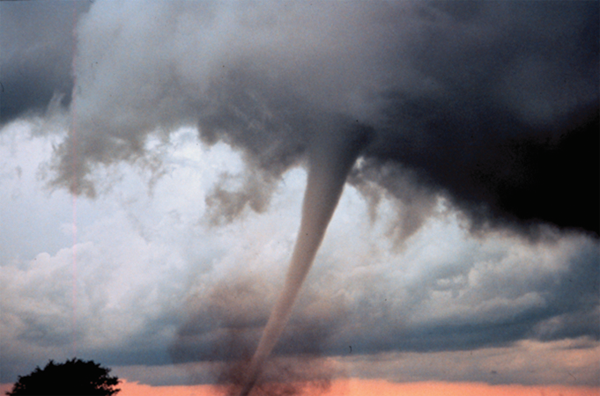
General Tips
If you are indoors:
- If time permits, draw blinds and shades over the windows in your home to help minimize the damage if the glass shatters. Move away from windows.
- Stay on top of the latest storm information through local media, Environment Canada’s website or a Weather radio.
- The safest place to be is an underground shelter, basement or safe room.
- If there is no basement, go to the centre of an interior room on the lowest level away from corners, windows, doors and outside walls. Put as many walls as possible between you and the outside.
- Get under a sturdy table and use your arms to protect your head and neck.
- Do not open windows or doors.
If you are outdoors:
- Do not wait until you see the tornado to get inside.
- Get inside a solid built structure immediately.
- If you are caught outdoors, lay flat in a nearby ditch or depression and cover your head with your hands.
- Do not get under an overpass or bridge. You are safer in a low, flat location.
- Watch out for flying debris.
Thunderstorms and Lightning
Thunderstorms are accompanied by lightning and may produce damaging weather such as tornadoes, hail, high winds and heavy rain. In Canada, lightning kills on average 9 to 10 people and seriously injures 92 to 164 people a year.
Prepare Now
- Review and discuss the safety tips with your entire household to make sure everyone understands what to do in a severe thunderstorm.
- Designate a safe place in your home away from windows, skylights and glass doors for household members to gather during a severe storm.
- Remove existing rotting trees and branches that could fall and cause injury or damage during a severe thunderstorm.
- Make a list of items to secure or bring inside during a storm such as garbage cans and lawn furniture.
- Use a surge protector (a special safety plug unit available at discount and hardware stores) to protect electrical items throughout your home. This will automatically shut down the electricity if lightning strikes, to prevent fires and damage to individual household items.
General Tips
If you are indoors:
- Stay indoors when a thunderstorm strikes. Remain indoors for at least 30 minutes since the last rumble of thunder to ensure the storm has moved well away from your location.
- Strong winds and large hailstones can shatter windows. Stay away from all windows, skylights and doors.
- Stay away from running water inside a house. Lightning can enter a house through pipes and plumbing. This means no showers or baths during a thunderstorm.
If you are outdoors:
- If you hear thunder, then lightning is close enough to be dangerous. Move immediately to a place of shelter. Go to a well-constructed, enclosed building. Small, open structures do not provide protection from lightning.
- Avoid water, high ground, isolated trees, picnic shelters and power lines.
- There isn’t a place outside that is safe during a thunderstorm. Make every effort to get into a solid shelter or metal-topped vehicle. If neither are available, find a low-lying area away from tall, pointy, isolated objects, crouch down and put your feet together. Do not lie down. Cover your ears to reduce the threat of hearing damage from thunder.
Severe Winter Storms
(Ice/Sleet Storm, Blizzard/Snowstorm)
Winter storms are common here, but they can be treacherous and damaging if you are unprepared. Bitter cold and winter storms kill more people than the number of Canadians killed by tornadoes, thunderstorms, lightning, floods and hurricanes combined. Being prepared can literally save your life.
Personal Preparedness –Before the Storm
- Add additional items to your emergency survival kit such as; extra warm clothes and blankets.
- Winterize your home to retain heat by insulating walls and attics, caulking or weather-stripping doors and windows, and installing storm windows or covering windows with plastic.
- Maintain heating equipment and chimneys by having them cleaned and inspected every year.
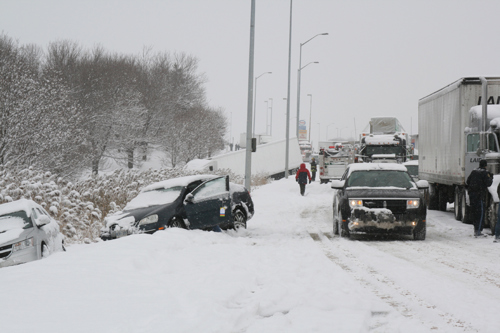
Safety Tips –During the Storm
If you are indoors:
- Listen to the radio and/or television for weather reports and emergency information.
- Stay indoors. If you must go outside, dress for the weather to avoid serious cold-related injuries.
- Running water, even at a trickle, helps prevent pipes from freezing.
If you are outdoors:
- Avoid overexertion when shovelling snow. If you must shovel snow, ensure you take frequent breaks so as not to over-stress your body.
- Dress in several layers of lightweight clothing, wear mittens and a hat (preferably one that covers your ears).
- Wear waterproof, insulated boots to keep your feet warm and dry and to maintain your footing in ice and snow.
- It is important to regularly check for frostbite, indicators include numbness or white areas on your face and extremities (ears, nose, cheeks, hands and feet in particular).
- Bring pets/companion animals inside during winter weather. Move other animals or livestock to sheltered areas with non-frozen drinking water.
Floods are the most common natural disaster we face here. They can occur at any time of the year and are most often caused by heavy rainfall, rapid melting of a thick snow pack, ice jams, or the failure of a natural or man-made dam or other infrastructure.
What to do before a flood
- Put weather protection sealant around basement windows and the base of ground-level doors.
- Install the drainage for downspouts a sufficient distance from your residence to ensure that water moves away from the building.
- Consider installing a sump pump and zero reverse flow valves in basement floor drains.
- Do not store your important documents in the basement. Keep them at a higher level, protected from flood damage.
- If you have a livestock farm, remember that livestock have a natural "move away instinct" to flash flood waters. They generally seek higher ground if possible. When purchasing or designing your livestock operation, it is important to allow livestock a way to reach high ground in each pasture. Without access, livestock will fight fences and be at a greater risk of drowning. Livestock will initially panic during flash floods. This complicates livestock handling.
If a flood is forecast
- Turn off basement furnaces and the outside gas valve.
- Take special precautions to safeguard electrical, natural gas or propane heating equipment.
- If there is enough time, consult your electricity or fuel supplier for instructions on how to proceed.
- In floods, in a rural farm setting, sheltering livestock may be the wrong thing to do. Leaving animals un-sheltered is preferable because flood waters that inundate a barn could trap animals inside, causing them to drown.
- If evacuation of the animals is being considered, then evacuation procedures, places, and routes should be planned. Animal evacuation routes must not interfere with human evacuation routes. Alternate routes should be found in case the planned route is not accessible. Places where animals are to be taken should be decided in advance and arrangements made with the owners of these places to accept the animals.
If flooding is imminent
- Move furniture, electrical appliances and other belongings to floors above ground level.
- Remove toxic substances such as pesticides and insecticides from the flood area to prevent pollution.
- Remove toilet bowls and plug basement sewer drains and toilet connections with a wooden stopper.
- Disconnect eavestroughs if they are connected to the house sewer.
- Do NOT attempt to shut off electricity if any water is present. Water and live electrical wires can be lethal. Leave your home immediately and do not return until authorities indicate it is safe to do so.
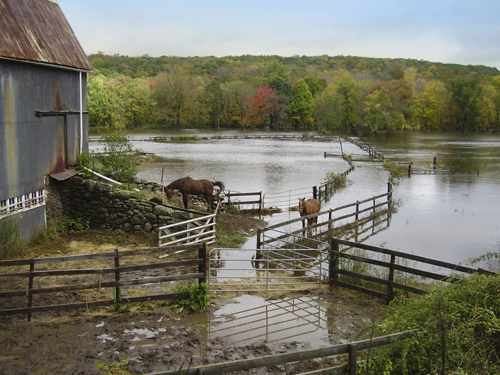
What to do during a flood
- Keep your radio on to find out what areas are affected, what roads are safe, where to go, and what to do if the local emergency services ask you to leave your home.
- Keep your emergency kit close at hand, in a portable container such as a duffel bag, backpack, or suitcase with wheels.
If you need to evacuate
- Vacate your home when you are advised to do so by local emergency authorities. Ignoring such a warning could jeopardize the safety of your family or those who might eventually have to come to your rescue.
- Take your emergency kit with you.
- Follow the routes specified by officials. Don't take shortcuts. They could lead you to a blocked or dangerous area.
- Make arrangements for pets.
- Time permitting, leave a note informing others when you left and where you went. If you have a mailbox, leave the note there.
Never cross a flooded area
- If you are on foot, fast water could sweep you away.
- If you are in a car, do not drive through flood waters or underpasses. The water may be deeper than it looks and your car could get stuck or swept away by fast water.
- Avoid crossing bridges if the water is high and flowing quickly.
- If you are caught in fast-rising waters and your car stalls, leave it and save yourself and your passengers
What to do after a flood
- When flood waters recede, watch for weakened surfaces.
- Keep away from downed power lines, especially near water.
- Monitor radio and TV for current information.
- If you evacuate, return home only when authorities advise that it is safe.
- Call your insurance agent.
- When it is safe to return home, be sure your house is not in danger of collapsing before entering.
- Open windows and doors to let air circulate.
- Take photos to record the damage.
- Download CMHC's After the Flood: A Homeowner's Checklist
Water
- Flood water can be heavily contaminated with sewage and other pollutants. It can cause sickness and infections.
- If through colour, odour or taste you suspect that your drinking water has been contaminated, don't drink it.
- Household items that have been flood-damaged will have to be discarded according to local regulations.
Extreme Hot Weather
What to do before extreme hot weather
- Tune in regularly to local weather forecasts and alerts so you know when to take extra care.
- If you have an air conditioner, make sure it works properly before the hot weather starts. Otherwise, find an air-conditioned spot close by where you can cool off for a few hours during very hot days. This will help you cope with the heat better.
- If you have an air conditioner with a thermostat, keep it set to the highest setting that is comfortable (somewhere between 22°C/72°F and 26°C/79°F), which will reduce your energy costs and provide you with needed relief. If you are using a window air conditioner, cool only one room where you can go for heat relief.
- Prepare meals that don't need to be cooked in your oven.
- Block the sun by closing awnings, curtains or blinds during the day.
- If safe, open your windows at night to let cooler air into your home.
What to do during extreme hot weather
- Stay indoors as much as possible and limit sun exposure.
- Drinking plenty of water.
- Stay on the lowest level out of the sunshine, if air conditioning is not available
- Consider spending the warmest part of the day in public buildings such as libraries, movie theaters, shopping malls, and other community facilities.
- Dress in lightweight, light-coloured clothing.
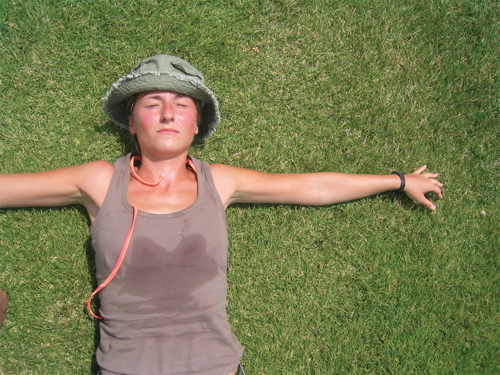
Watch for symptoms of heat illness, which include:
- dizziness or fainting;
- nausea or vomiting;
- headache;
- rapid breathing and heartbeat;
- extreme thirst (dry mouth or sticky saliva);
- and decreased urination with unusually dark yellow urine.
If you experience any of these symptoms during hot weather, immediately move to a cool place and drink liquids. Water is best.
Heat stroke is a medical emergency! Call 911 or your local emergency number immediately
if you are caring for someone, such as a neighbour, who has a high body temperature and is either unconscious, confused or has stopped sweating.
While waiting for help - cool the person right away by:
- moving them to a cool place, if you can;
- applying cold water to large areas of the skin or clothing;
- and fanning the person as much as possible.
What to do before extreme cold weather
- Prepare your home for cold winter temperatures by doing regular maintenance. Make sure your heating system is working efficiently and seal all cracks and drafts to keep the heat in.
- Learn how to shut off water valves (in case pipes burst).
- Store a good supply of dry, seasoned wood for your fireplace or wood-burning stove.
- Winterize your home by insulating walls and attics and weather-stripping doors and window.
- Allow faucets to drip a little during cold weather to avoid freezing.
- Be sure to check your vehicle maintenance and antifreeze levels to avoid freezing.
- Keep a full tank of gas during the cold winter months.
- Install smoke and carbon monoxide alarms in your home.
- Pay attention to weather alerts in your area. Special weather statements and warnings are issued when extreme weather is possible in your area. Environment Canada issues wind chill alerts to warn you of conditions that will cause frostbite to exposed skin
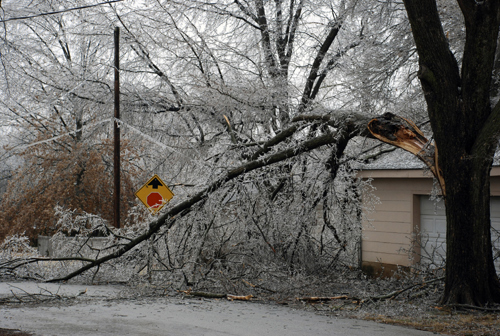
What to do during extreme cold weather
- Stay indoors and use safe heating sources.
- Check on elderly or friends, family members and neighbours with special needs.
- Drink plenty of liquids and eat high calorie foods.
- Seek medical attention if frostbite or hypothermia is suspected.
- Dress in layers with a wind resistant outer layer. You can remove layers if you get too warm (before you start sweating) or add a layer if you get cold.
- If you are caught in a severe snowstorm, or outside in extreme cold conditions, look for shelter. If there are no buildings around, a small cave, ditch, hollow tree or a vehicle can help reduce your chances of frostbite or hypothermia.
- Even if you find shelter, keep moving to maintain your body heat
